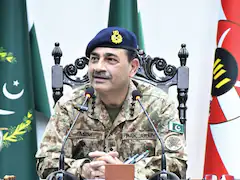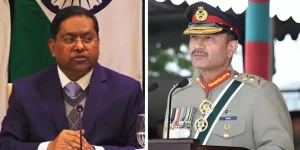Washington D.C. – Pakistan Army Chief Field Marshal Asim Munir’s latest Asim Munir US Visit has generated significant controversy following his inflammatory anti-India rhetoric delivered to the Pakistani-American community in Tampa, Florida. The speech, which included explicit threats regarding dam construction and renewed claims over Kashmir, has drawn sharp criticism from Indian authorities who characterized the statements as dangerous nuclear sabre-rattling.
During this Asim Munir US Visit, Munir made several provocative statements that have escalated regional tensions and raised international concerns about Pakistan’s approach to nuclear diplomacy. His comments represent a significant departure from diplomatic norms typically expected during official visits to allied nations.
The Asim Munir US Visit has thus become a focal point for broader discussions about Pakistan’s nuclear posture and its implications for regional stability in South Asia.
Explicit Threats Against Indian Infrastructure Projects


The most controversial aspect of the Asim Munir US Visit involved Munir’s explicit threats regarding Indian dam construction projects on the Indus River. Speaking to the Pakistani-American community, Munir declared that Islamabad would defend its water rights “at all costs” if India proceeded with planned dam construction activities.
In perhaps the most alarming statement during this Asim Munir US Visit, Munir reportedly told community members: “We will wait for India to build a dam, and when they do so, we will destroy it.” This direct threat against civilian infrastructure represents a significant escalation in military rhetoric and raises serious questions about Pakistan’s commitment to peaceful conflict resolution.
The Asim Munir US Visit thus featured unprecedented threats against infrastructure projects that could have far-reaching implications for regional water security and bilateral relations between the two nuclear-armed neighbors.
Kashmir Claims and International Agenda Assertions


During the Asim Munir US Visit, Munir reiterated Pakistan’s long-standing position on Kashmir, describing it as Pakistan’s “jugular vein” and asserting that it represents “not an internal matter of India but an incomplete international agenda.” These statements directly challenge India’s sovereignty over the region and attempt to internationalize what India considers a domestic matter.
The Asim Munir US Visit featured references to Pakistan’s founder, with Munir quoting the Quaid-e-Azam’s historical characterization of Kashmir as Pakistan’s “jugular vein.” This historical framing during the Asim Munir US Visit demonstrates Pakistan’s continued commitment to challenging Indian control over the disputed territory.
These Kashmir-related statements during the Asim Munir US Visit represent a continuation of Pakistan’s diplomatic strategy to maintain international attention on the Kashmir dispute while rejecting India’s position on territorial sovereignty.
India’s Strong Diplomatic Response


Indian External Affairs Ministry spokesperson Randhir Jaiswal issued a comprehensive response to the controversial statements made during the Asim Munir US Visit, characterizing the remarks as typical Pakistani “nuclear sabre-rattling” and emphasizing India’s refusal to succumb to nuclear blackmail tactics.
Jaiswal specifically addressed the inflammatory nature of the Asim Munir US Visit remarks, stating that “nuclear sabre-rattling is Pakistan’s stock-in-trade” and suggesting that the international community should draw its own conclusions about the irresponsibility inherent in such statements from a nuclear-armed state.
Also Read: Al Jazeera Journalist Leaves Heartbreaking Final Message Before Death In Gaza
The Indian response to the Asim Munir US Visit also highlighted concerns about Pakistan’s nuclear command and control integrity, particularly given the military’s alleged connections with terrorist groups, raising questions about nuclear security and responsible stewardship of nuclear capabilities.
Concerns About Nuclear Command Integrity
Indian sources characterized the Asim Munir US Visit statements as reflecting deeper concerns about Pakistan’s nuclear governance structure, describing Pakistan as “an irresponsible nuclear-armed state, with a non-trivial risk of nuclear materials or expertise reaching non-state actors.”
The commentary on the Asim Munir US Visit emphasized international skepticism about nuclear weapons remaining under the control of Pakistan’s military institution, which Indian sources described as “accountable to no one” and therefore unsuitable for nuclear stewardship responsibilities.
These concerns about the Asim Munir US Visit rhetoric reflect broader international apprehensions about nuclear proliferation risks and the potential for nuclear capabilities to be misused or fall into inappropriate hands.
Regional Stability and Nuclear Brinkmanship
Indian sources identified the Asim Munir US Visit statements as part of Pakistan’s historical pattern of “rhetorical nuclear brinkmanship” while simultaneously attempting to maintain international credibility as a responsible nuclear actor. This contradictory approach was characterized as a primary source of regional instability.
The analysis of the Asim Munir US Visit identified Pakistan’s military establishment as the central driver of nuclear instability in South Asia, particularly concerning because it effectively controls the nuclear decision-making process without adequate civilian oversight or democratic accountability.
Official Visit Context and Diplomatic Engagements

The Asim Munir US Visit included various high-level interactions with senior American political and military leadership, as well as extensive engagement with Pakistani diaspora communities. According to Pakistani army statements, this visit marked a new dimension in Pakistan-US relations following Munir’s previous visit just one and a half months earlier.
During the Asim Munir US Visit, Munir attended the retirement ceremony of outgoing United States Central Command Commander General Michael E. Kurilla and participated in the Change of Command ceremony for Admiral Brad Cooper. These military diplomatic engagements provided the framework for broader discussions about regional security and bilateral cooperation.

The Asim Munir US Visit also included meetings with Chairman Joint Chiefs of Staff General Dan Caine, where matters of mutual professional interest were discussed, and Munir extended an invitation for General Caine to visit Pakistan, demonstrating ongoing military-to-military diplomatic engagement.
Diaspora Engagement and Investment Promotion
The Asim Munir US Visit featured significant outreach to Pakistani diaspora communities, with Munir urging them to remain confident about Pakistan’s future prospects and actively contribute to attracting international investments. This community engagement represents a crucial component of Pakistan’s diplomatic strategy in the United States.
Pakistani diaspora members reaffirmed their commitment to supporting Pakistan’s progress and development during interactions with Munir, demonstrating the continued connection between overseas Pakistani communities and their homeland’s military leadership.

